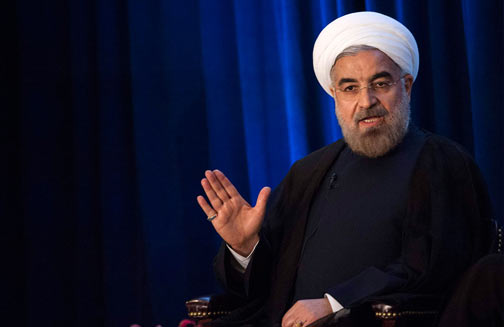
An Iranian analyst says Tehran-Paris relations need to be redefined after the French capital recently hosted the annual gathering of the notorious anti-Iran terrorist group MKO.
The editor-in-chief of the Iranian Diplomacy news website has, in an analytical piece, talked about the recent gathering of the terrorist Mojahedin-e-Khalq Organization (MKO or MEK) in the French capital of Paris.
Sergei Barseghian has underlined the need for a redefinition of Tehran-Paris ties given the European side’s support for the anti-Iran terrorist cult.
The following is the full text of article:
The gathering of MKO ringleader Maryam Rajavi’s cult in Paris was a repeat of last year’s show; there were even no new faces among the VIP guests, who included former officials of different countries. In other words, the MKO had failed to attract any new individuals. Turki al-Faisal, Bernard Kouchner, Newton Gingrich, Rudy Giuliani, Joe Lieberman, John Bolton, etc., all have delivered speeches at MKO gatherings before. However, no new member has joined their clan, which means a failure. The presence of former French President Bernard Kouchner at this year’s gathering and his delivering a speech must be strange. However, it was not the first time he made comments about Iran’s political system. He had made similar remarks during Iran’s 2009 post-election unrest when he was foreign minister. Turki al-Faisal’s comments should not be taken seriously, either. This Saudi prince, who claims Iran’s presidential elections are undemocratic, has objected to Riyadh’s handing over the throne to Mohammad bin Salman. The former US officials attending the gathering are the same individuals present in previous events. Bolton, Lieberman and Giuliani are the same people who wrote a letter to US President Donald Trump urging him to cooperate with the MKO against Iran.
The Associated Press and Fox News reported in early 2017 that Newton Gingrich and Rudy Giuliani had benefited from the MKO’s “generosity” for delivering speeches against Iran. Incumbent US Transportation Secretary Elaine Chao has confessed that he received $50,000 for delivering a five-minute speech. Still, Rajavi has failed to entrap any new bribees.
But what is important is that the MKO gathering was held just hours after Iranian Foreign Minister Mohammad Javad Zarif visited Paris. Of course, in reaction to the gathering, Zarif said the MKO get-together was a “moot point in relations” with France, and quoted French officials as saying that Paris has no relations with the MKO. But a terrorist group holding a gathering in another country attended by former officials of some other countries and marked by speeches against the legal and official system of a certain state (Iran) is something beyond a moot point, and is regarded as a “move against” international law, which the Iranian foreign ministry and embassy should not easily ignore. Moreover, the timing of Zarif’s trip is under serious criticism given that the date of the MKO’s gathering had already been announced. And there is some doubt about the French officials’ giving assurances that they have no connection with the MKO, especially at a time when they remain silent in the face of a gathering that the former French foreign minister calls a “family meeting.”
The issue cannot be settled simply by summoning the French ambassador or charge d’affaires in Tehran to the Foreign Ministry. Kouchner has claimed that “You were oppressed in my country, France, and I feel guilty for that.” By “being oppressed” he meant the French government’s attack on the MKO’s headquarters in Auvers-sur-Oise, a commune in the northwestern suburbs of Paris, in mid-2003. Some 300 members of the terror group were arrested in the raid on charges of planning to carry out terrorist operations. But France seems to have changed its approach toward the MKO since 2003, so much so that it hosts the terror group’s annual gathering.
The raid on the MKO’s base came a few days after then Iranian Foreign Minister Kamal Kharrazi hit out at his French counterpart Dominique de Villepin, saying it was unacceptable and not understandable that a terrorist organization was present in France and operating there.
“It seems these terrorists, who have dealt a blow to us in Iran, enjoy a sort of immunity in Auvers-sur-Oise,” Kharazi had noted at the time.
MKO members claim de Villepin had told Kharrazi that “I can tell you that Nicolas Sarkozy is preparing an operation in this regard.” If this admission by MKO terrorists is accepted, then the Iranian diplomacy will assume a much more important role. Perhaps here we should change the diplomatic language from a “moot point” to the “element of accusation”. Governments which have fallen victim to terrorism “enjoy the legitimate right to defend themselves against armed operations conducted by non-governmental dissident groups in a third country.” Under the current circumstances, Iran-France relations need a serious ultimatum and should be redefined, given that Paris has hosted an MKO banquet for former politicians with a past rife with failures. Another point is that not even one election has been held at the MKO while the terror group claims that there should be “elections and freedom” in Iran.
The MKO is the most hated terrorist group among Iranians because of its dark history of assassinations and bombings and for siding with former Iraqi dictator Saddam Hussein in his eight-year war against Iran in the 1980s.
One of the MKO’s deadliest terrorist operations was carried out on 28 June 1981 when a powerful bomb went off at the headquarters of the Islamic Republic Party of Iran in Tehran, while a meeting of party leaders was in progress. Over 70 top Iranian officials were killed in the bomb blast.
Out of the nearly 17,000 Iranians killed in terrorist assaults since the victory of Iran’s 1979 Islamic Revolution, about 12,000 have fallen victim to MKO’s acts of terror.
